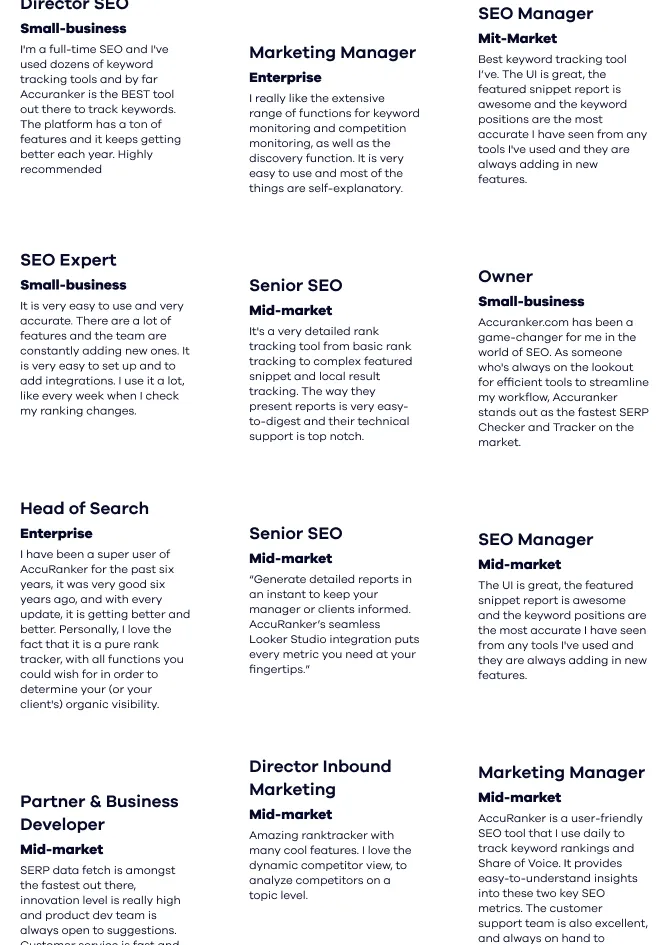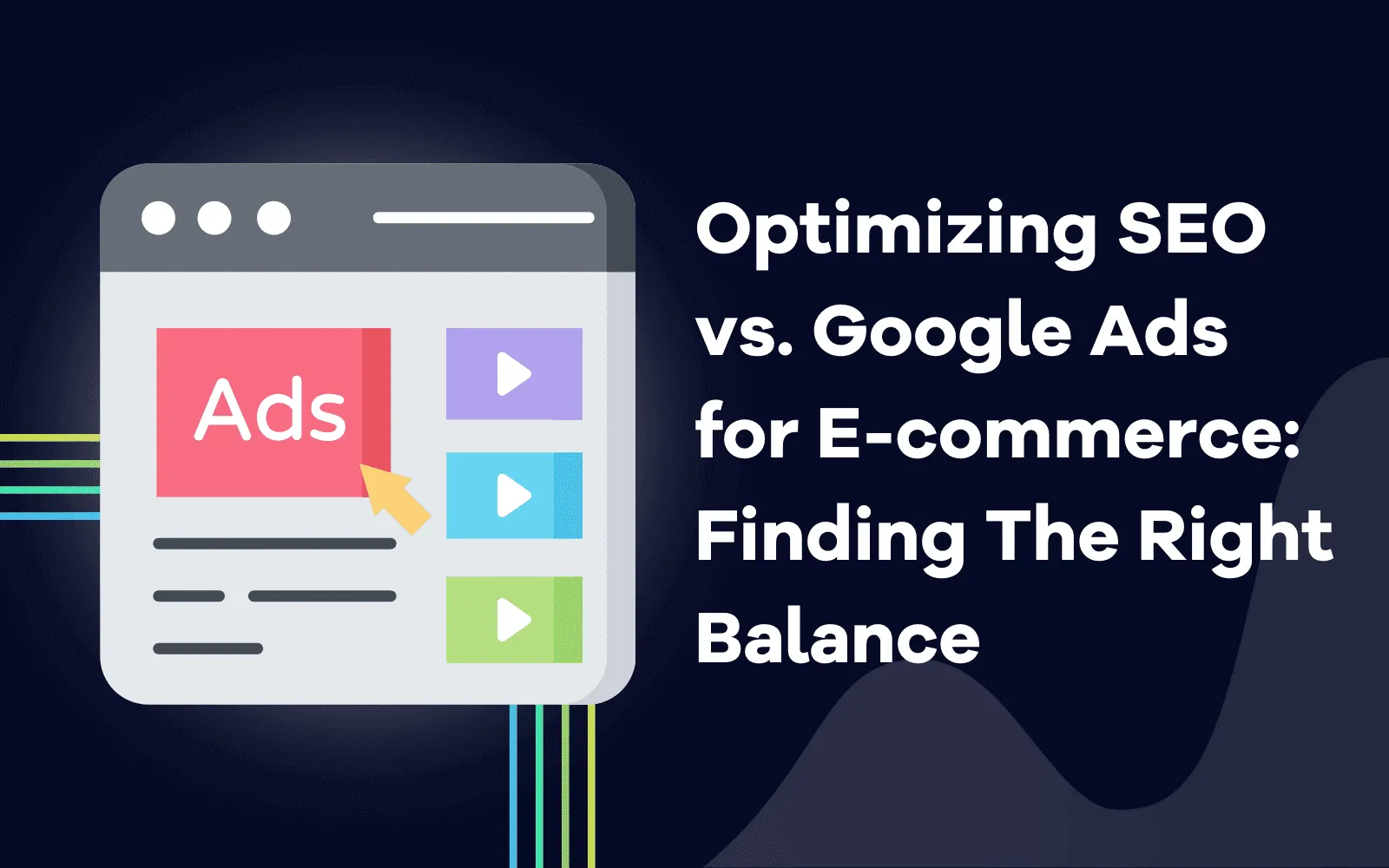
Optimizing SEO vs. Google Ads for E-commerce: Finding The Right Balance

Colin Cook
March 6, 2024
Discover how to achieve optimal results in E-commerce by striking the perfect balance between SEO and Google Ads. Unlock your brand's potential today.
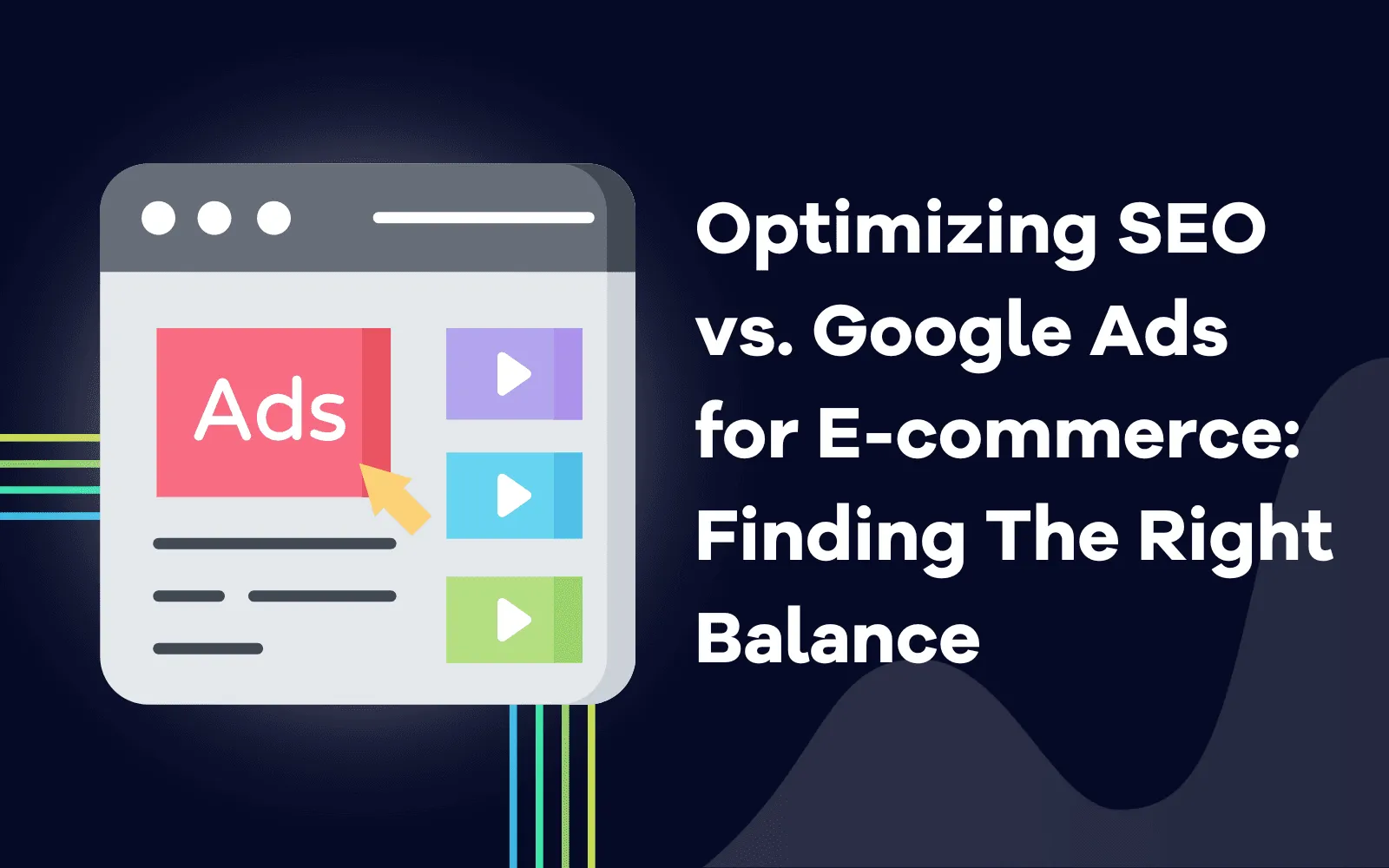
It’s a question that every business in the online space has asked - what marketing channel should I be investing in? Google Ads and SEO both provide serious upside for e-commerce brands looking to sell products online. Still, it’s important to find the right mix for your particular business, the products you offer, and the demographic you are going after.
This blog aims to be your compass in the digital marketing wilderness. We're here to guide e-commerce brands through the maze, helping you find the perfect balance between SEO and Google Ads. This isn't just about growth; it's about sustainable growth. Let's embark on this journey together and transform your brand into a digital success story.
What are the Channels of SEO and Google Ads?
Defining the Channels
First, let’s define what we mean when discussing these titans of any marketing strategy. Along with social media advertising, Google Ads and SEO should form the foundation of your overall sales strategy. Each has its place in the larger marketing picture to get your brand in front of the right kinds of users.
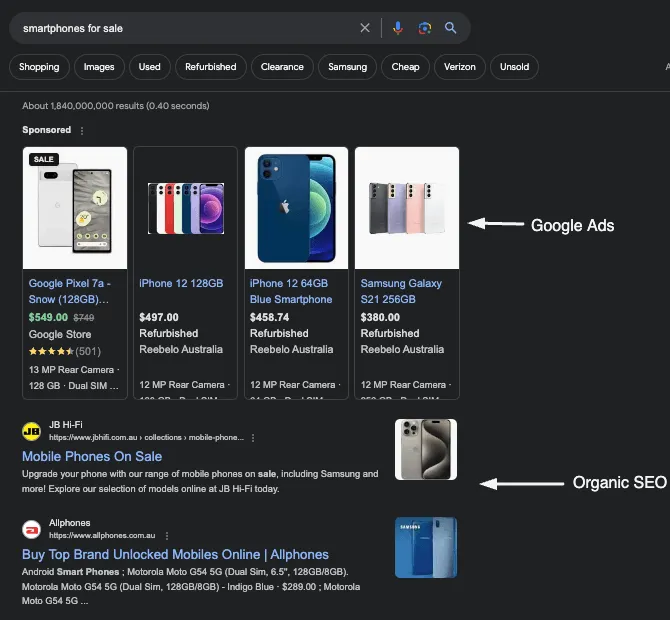
SEO, or Search Engine Optimization is considered a long-term play with the ultimate aim of having your website appear in search engines for high-traffic keywords without the need to allocate a budget on a per-click basis, as is the case with ads.
SEO has been likened to planting a seed you hope to one day see grow into a tree. This process demands patience, consistency, and a strategic approach. The ultimate reward is a natural increase in visibility and website traffic, achieved without the perpetual costs tied to direct advertising. Over time, for a larger successful brand, this channel can be the main workhorse to bring in traffic and generally has a higher engagement rate than traffic from other mediums.
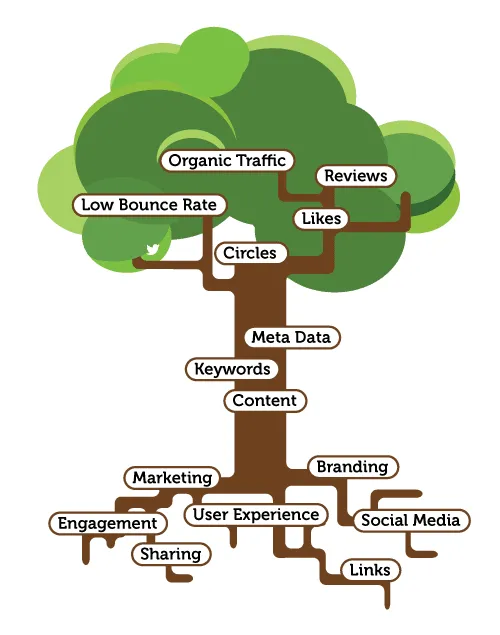
Source: Global Reach
Google Ads operates on principles of immediacy and specificity. This platform lets businesses place their product directly before potential customers, facilitating rapid traffic influx and heightened visibility. It's a targeted approach designed to capture the attention of specific market segments efficiently. From an e-commerce perspective, Google Shopping ads provide a way for users to visually see products and prices in search engines, an important place to be seen by potential customers.
Long Term vs Short Term
The contrast between SEO and Google Ads is stark yet complementary. SEO focuses on building credibility and authority over time, enhancing a brand's presence in organic search results. It comes down to proving yourself to Google as a reliable brand that can be trusted and has a product offering that people are interested in, a process that naturally takes time. Google is only in the business of endorsing a business with top positions in search once it has good reason to do so, drawing on all the information on the internet to ascertain how worthy. It should be considered a holistic approach to marketing that incorporates a number of moving parts, including your website, content, authoritativeness, and time in the market.
Google Ads, however, provides an immediate boost, ideal for targeted marketing campaigns or promotional pushes. It also allows for smaller brands to have a fighting chance in the early stages of their growth, where they are lesser known and are still working to establish themselves in the market.
Whether a brand is better suited to SEO or Google Ads varies by business type and objectives. Startups or businesses with urgent promotions might lean towards Google Ads for its quick results. Conversely, businesses aiming for long-term market presence and authority might invest more in SEO.
SEO demands ongoing effort and adaptation, contrary to the belief that it's a one-off task. Similarly, Google Ads is not merely an expense but an investment, with the potential for significant returns when managed correctly.
The Synergy Between SEO and Google Ads
Using Both Channels in Your Strategy
When working within a strict budget, investing in SEO and Google Ads might feel like you are spreading yourself too thin. However, this perspective misses the bigger picture. These tools can create a powerful synergy, amplifying your brand's online presence and credibility.
Let's break down how this works. Google Ads provides immediate data and results, offering insights into which keywords and phrases resonate with your target audience. This information is invaluable for your SEO strategy. By understanding which keywords drive traffic and conversions, you can tailor your website's content to align with these terms, improving your organic search rankings and relevance.
The behavior insights from Google Ads, such as the most clicked-on ads or the highest-converting landing pages, can inform your e-commerce SEO content strategy and website design. This ensures a cohesive user experience across paid and organic search results, enhancing your brand's credibility and user engagement.
Maximizing Visibility in Search
The combined impact of SEO and Google Ads on brand visibility is significant. While SEO builds a solid foundation and credibility over time, Google Ads can quickly boost visibility, filling in gaps while your SEO efforts gain momentum. This dual approach ensures that your brand remains at the top of potential customers' minds, whether they're scrolling through organic search results or clicking on ads. The ultimate aim for any e-commerce business should be to dominate the SERPs real estate in search results for relevant products - a strategy that focuses on both channels is imperative to achieve this.
Google has made it clear: there's no direct connection between Google Ads and your site's SEO ranking. However, the indirect benefits—such as keyword and behavior insights—are undeniable. Leveraging the data from Google Ads can significantly enhance your SEO strategy, leading to better content, improved user experience, and higher organic search rankings.
How can you effectively integrate SEO and Google Ads into your marketing plan? Start by setting shared goals for both channels, ensuring they support a unified marketing strategy. Use Google Ads data to refine your SEO keyword strategy and content creation. Regularly review the performance of both channels, using insights from one to optimize the other. Most importantly, maintain a consistent message and branding across SEO and Google Ads to reinforce your brand's identity and value proposition.
But Where Should I Put My Budget?
Figuring Out Where You Are At
Deciding how to divvy up your marketing budget is a dilemma many business owners have to tackle. As an e-commerce brand, what percentage of spend should you split between these two channels?
Well, the marketer’s go-to answer to this kind of question is the old classic ‘it depends’ - something we hear all too often from agencies and consultants. However, you’ll be pleased to know that with a clear understanding of your brand, your competition, and your audience, you can significantly narrow it down and get a sense of where your marketing dollar should be going. Here are some of the secondary questions you should be thinking about to inform your budget split:
How established is your business?
The more established, the more likely you are to get results relative to your SEO spending. SEO can help you reflect the quality of your business and offering in these cases.
How do people interact with your products?
If your products are quite expensive by e-commerce standards, and customers generally take time and conduct research and make a decision, SEO can provide higher relative value compared to other kinds of products.
Is your product filling a gap in the market or similar to other products out there?
Finding a niche is smart from a general business perspective and for both channels. This is really about understanding the competitive advantage that your service and/or product has over the competition. If you have better pricing, Google Ads will work really well for you, and you may be best served leaving your budget there. If no one else is offering your products, SEO can help you attract traffic to education and provide informational content to your target market.
Which competitors are you going up against and how established are they?
If you are offering a fresh product on the market, informational-based content is going to be important and chances are you will be more often catching people in the awareness phase of the buying journey. This lends itself more to SEO. If you compete with brands with a huge market share and have been around for decades, the chance of outranking them organically is low, so Google Ads may need to be a bigger part of your strategy. See the below search result as an example:
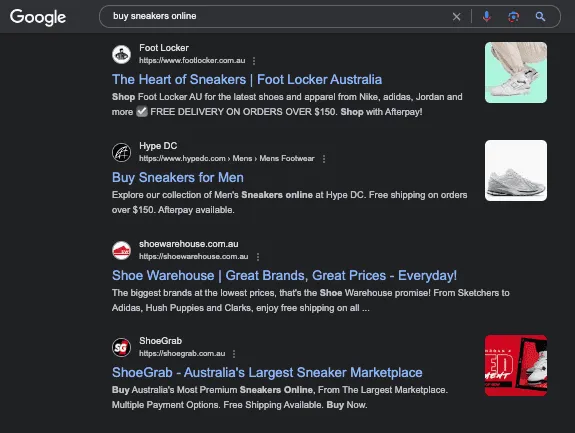
Breaking it Down
A good way to approach this is to figure out the upside of each channel, considering the answers to the above questions. Let’s simplify things to give you a good starting point in deciding.
When to Invest More Heavily in SEO?
Breaking it down into a simple, understandable formula is to think of SEO as a channel to cast a wider net and catch people higher up in the sales funnel. Here, you are putting yourself out there as an expert, providing answers to questions, drawing traffic for all kinds of different searches (whether transactional or informational), and working on your website infrastructure and content to appeal to as many people in your target market as possible. This is often a luxury that isn’t as feasible for smaller brands but can help turn a mid-tier business into a hugely successful one and grow traffic to astronomical levels relative to your spending over time. If you are later on in the growth stage of the business, have worked up some sort of a reputation in the field, and are operating in a market that big brands underrepresent, the conditions can be perfect for taking advantage of low-hanging fruit in the SEO space.
When to Invest More Heavily in Google Ads?
If your brand is the new kid on the block and looking to gain immediate visibility, allocating a larger portion of your budget to Google Ads is wise. SEO work done on a new domain provides a relatively lower immediate ROI. It isn’t going to serve you a new business looking to generate revenue and brand awareness out of the gate. Google Ads, however, will provide you with more traffic in the early stages (because it’s guaranteed) and allow you more data to pivot and figure out what works and what doesn’t. It is the ideal way to kick things off, get your name out there, and test your target market's response. As discussed, this information can be invaluable to SEO and other strategies later on.
While SEO casts a wide net, Google Ads is more about picking your spots and getting in front of people when they are much closer to making a decision to purchase. For most small brands in the first couple of years in their journey, Google Ads will be the engine of your sales funnel and is a much more direct way to generate revenue.
Conclusion
Ideally, the decision on how to split up your budget should be made on a case-by-case basis, and the information provided here should be considered a general guide. An experienced marketer will be able to look at your brand and website and give you a good idea of the upside in each channel. Generally speaking, the best-performing e-commerce brand puts time and resources into both channels. We consistently see that combining the two yields the best results over time.
Remember, digital marketing is not a set-and-forget endeavor. It's a continuous cycle of learning, testing, and adapting. The digital landscape is always changing, and so should your strategies. Embrace this evolution, stay curious, and be willing to pivot based on what the data tells you.
Related blog posts
Google Num 100 Update
19 September 2025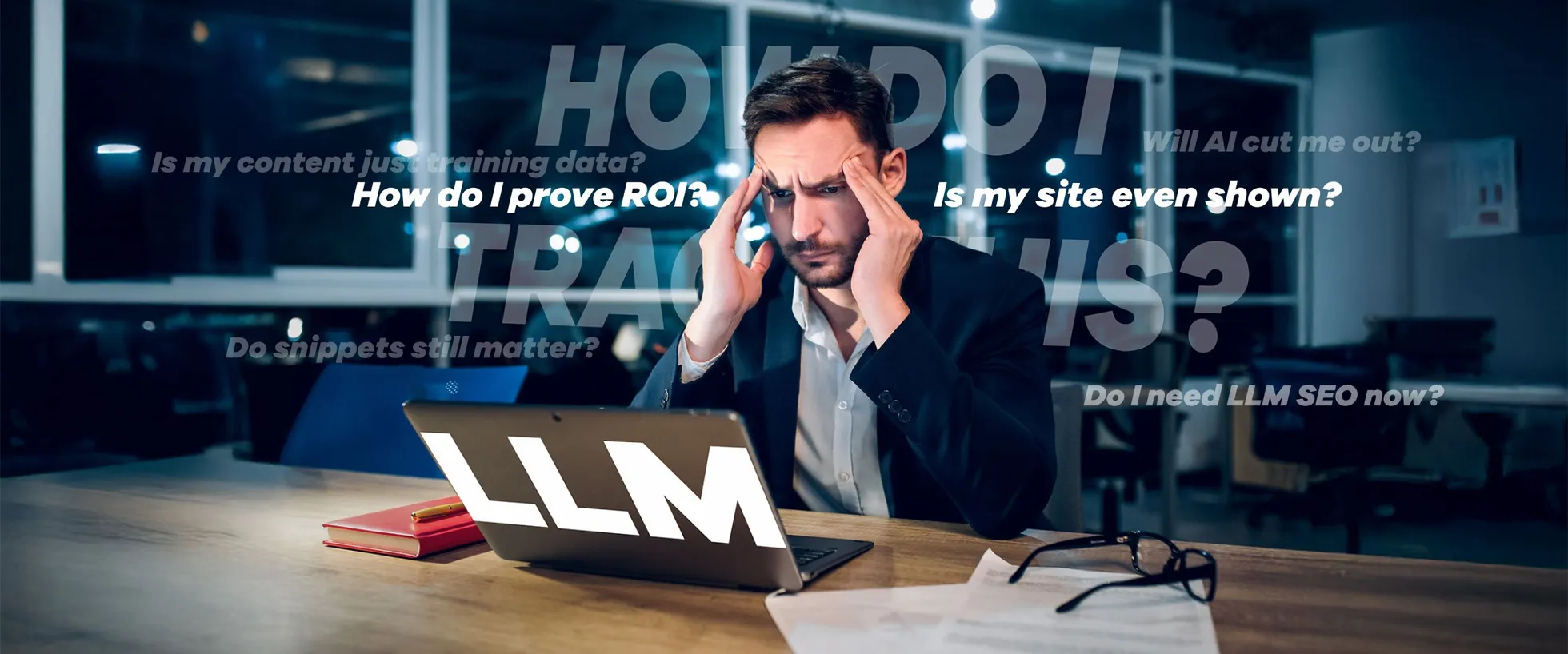
How LLMs Change Traditional SEO Metrics
Learn why rankings, CTRs, and impressions fail to measure visibility in AI-powered search — and what SEOs should track instead.
15 July 2025LLM Tracking Explained
Learn what LLM tracking is and why being mentioned in AI-generated answers is becoming a vital layer of visibility in SEO.
13 July 2025



